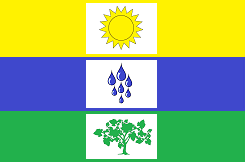
Permavillage | Pdfs | Know-How | Videos | Contact | Updates [Z05.6]
What is a Permavillage?
A Permavillage is defined by a simple equation :
Permavillage = Village + Permaculture
As permaculture was defined by Bill Mollison as permanent agriculture, so a Permavillage is permanent as well. Of course nowadays we would rather say 'sustainable'.
Actions
- Start on any piece of land
- Collect rainwater
- Create biodiversity
- Grow your food and medicinal plants
- Use a composting toilet
- Recycle everything
- Use the rocket stove and solar oven
- Expand your permavillage
How can a permavillage be sustainable?
Given the current state of our planet, I'm pretty convinced that we all know what we've been doing wrongly so far, and what should not be done if we want our permavillage to be sustainable.
Five conditions
I have come up with five conditions that I believe should be fulfilled if we want our permavillage to be sustainable, and if you think of any other please let me know.
Condition 1 -- 100% Local
Everything must be produced AND recycled locally. We'll have to produce water, food, heat, fertilizers, seeds, etc., and we'll have to recycle ALL the waste.
Condition 2 -- No Tech
We will not use modern technologies because of the disappearance of oil - and I mean petroleum -. Let us remember that these technologies - including electricity - need oil: as a raw material; for the extraction of metals, ores and metalloids in mines; for transportation; for maintenance; repairs; and the recycling. Oil and fossil fuels in general will disappear, willingly or not, because of climate change and the peak oil phenomenon.
Condition 3 -- Stable Population
We will maintain a stable population, not exceeding the Dunbar number, namely 150 individuals. Above this number, mutual trust and communication are no longer sufficient to ensure the group's functioning. It is then necessary to move on to a more important hierarchy, with an important structure and rules. This is something we obviously want to avoid at all costs.
Condition 4 -- Sustainable Energy
To feed our permavillage we will choose a sustainable energy. And when I speak of energy, I am thinking here of primary energy, that is, of the energy found in Nature, before any transformation. What is found in Nature? The infamous fossil fuels - gas, coal, oil - the more infamous uranium, and fortunately we also find water, sun, wind, etc. Among these last sustainable energies we will choose the Sun that will allow us to cultivate the plants, trees and shrubs necessary for our food, cooking and heating.
Condition 5 -- Vital Needs
We'll focus on seven vital needs: air, safety, water, food, heat, hygiene and health.
- Air : we'll avoid areas polluted by fine particles and we'll move away as much as possible from nuclear power plants; from this point of view, the southern hemisphere is ideal, with only three nuclear power plants...
- Safety : we want to be as safe as possible from natural disasters, so we'll try to avoid seismic zones and cyclone-prone areas; unfortunately countries that meet those conditions in the southern hemisphere are very few, so it may be necessary to make concessions...
- Water : obviously we'll collect, store and filter rainwater, but we'll also use the five complementary techniques from Toby Hemenway to support the goal of ample water: 1 build organically rich soil, 2 contour the landscape to catch water and direct it to where it is needed, 3 include drought tolerant plants when possible, 4 plant densely to shade the soil, and 5 mulch deeply; finally we'll also use gray water for the garden and apply it to the base of nonfood plants, fruit trees and shrubs.
- Food : we'll use the precepts and techniques of permaculture and also the distribution of crops according to John Jeavons: 50% of plant biodiversity, 30% of plants carbon, 15% of plants calories and 5% vegetable for vitamins and minerals
- Heat : we'll heat ourselves using the technique of the rocket stove, which is little fuel-intensive and almost non-polluting, then we will cook our food using that same technique in winter, and by using solar ovens in summer
- Hygiene : we'll manufacture all the products of maintenance and hygiene in a natural way, and of course we'll only use compost toilets, from which the contents will be recycled on the land
- Health : a life in the open air, plus a diversified and living diet will ensure good health naturally, and for small pains, slight injuries, scratches and grazes, we will use medicinal plants.


© 2017-2026 Patrizio Di Gianni
Founder of the Permavillage in 2017




